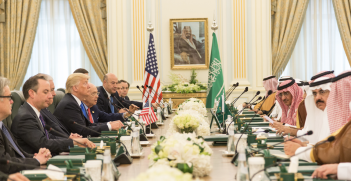Traditionalism Through Progress – Absher and the Paradox of Saudi Development

Saudi Arabia’s Absher app has been the source of much criticism. Its continued use at a time when the country is supposed to be enacting progressive reforms demonstrates the kingdom’s continual efforts to balance modernising forces with a parallel duty to uphold traditionalism.
Controversies surrounding the Absher app have rocketed Saudi Arabia into international headlines once again over the past month. The app has drawn considerable criticism from rights groups, who claim that it effectively augments the country’s patriarchal guardianship laws. Advocates contest such a characterisation, arguing that, quite the contrary, Absher has acted as a tool for practical female empowerment.
While debate remains heated around the nature of the app and what it represents for women’s rights, the paradox of Absher as a tool to “modernise” guardianship speaks to a deeper, structural perverse trend within the Kingdom today: employing tools associated with progressive modernity to reinforce traditionalism and authoritarianism.
Digitising guardianship
Launched in 2015, Absher was designed by the Saudi Interior Ministry to provide users with remote access to the country’s national portal – think Australia’s myGov and you are in the general ballpark. Hosted on both Apple and Android platforms, the app offers more than 160 governmental services and aims to reduce paperwork and bureaucratic red tape via automation. It is estimated to be utilised by around one-third of the Kingdom’s highly plugged-in population.
Despite this seemingly benign intent, one component of Absher has elicited international and local condemnation – a feature that enables men to track, permit and restrict the movements of women under their charge remotely.
Critics have argued that this essentially streamlines a key component of the guardianship laws, which reduce women to the status of minors and require many legal and economic decisions be approved by an appropriate male relation: be that father, husband, brother or, in some cases, sons.
Others have suggested that Absher represents a net positive in the prolonged battle for gender equality in the Kingdom. They argue that the app provides greater freedom of movement for Saudi women in practical terms by essentially outsourcing the hands-on hypervigilance customarily required remotely. Women can now travel far more freely without needing the physical proximity of a guardian and are freed up to maintain independent employment, engage in social activities and pursue their own interests.
While not an ideal end state, Absher represents an important first step that will open the opportunity for further shifting of norms in the future in the minds of many supporters.
Conservative modernisation
The persistence of Absher seems especially peculiar in the wake of the Saudi Vision 2030 reform initiative. As part of a wider effort to modernise, diversify and open the national economy, the administration and its defacto figurehead, crown prince Mohammad bin Salman (MBS), have relentlessly claimed a commitment to the emancipation of Saudi women.
Indeed, the regime has continuously promoted itself as a champion for female rights. This was most prolifically observed in the landmark decision to permit female drivers in 2018 but has extended to a lessening of public dress code requirements, suffrage in local elections, restrictions on the religious police, and increasing opportunities to participate in the labour market in both the public and private sectors.
Nevertheless, the regime has reserved the sole right to determine what gender-related policies will be altered and implemented. It has aggressively quashed any calls for greater consultation and transparency, imprisoning and allegedly torturing numerous domestic rights activists.
This, in part, stems from a fundamental schizophrenia at the heart of Saudi policy making – the need to simultaneously move forward economically and developmentally, while at the same time preserving a semblance of Islamic traditionalism for domestic consumption.
Patronage and core bases of support
This tension can be traced back to the mid-18th century when the nascent Saudi state formed a symbiotic relationship with the ultra-conservative Islamic revivalist “Wahabi” movement of central Arabia. Ever since, a key pillar of the regime’s legitimacy has been predicated on assuaging this sizable demographic by ensuring their social and religious values remain dominant in Saudi society (a topic I have researched extensively). Due to this patronage, Saudi revivalists have been the first group to rally around the regime against detractors during times of political crisis, such as during the 2011 Arab Spring.
As a result, all Saudi administrations have had to finely balance their efforts to modernise with a parallel duty to uphold traditionalism. This was most blatant in the wake of the oil boom of the 1970s. The rents derived from the immense increase in crude prices during this time stimulated unprecedented development inside the Kingdom. At the same time, they stoked social tension, as traditionalists found their way of life and sensibilities profoundly challenged by the flood of new technologies and ideas.
To alleviate this, Kings Faisal, Khalid and Fahd all ensured that the regime concurrently sponsored an array of policies that empowered revivalism inside the Kingdom. As economic development intensified, the Wahabi establishment found itself empowered with an array of new privileges in the education, media and religious enforcement sectors. Religious education increased, sermons and preaching became more prolific on television and radio and religious police became more prolific in the public space. Thus, while the Saudi state and society moved forward incrementally overall, it also saw a paradoxical strengthening and entrenching of religious conservativism.
The inescapability of history
The recent controversy surrounding Absher demonstrates this dynamic as alive and well. Despite the internationally broadcast image of a state breaking revolutionarily from its past, Saudi Arabia will continue to wrestle with the heavy legacies of its past – balancing the requirements of progress, modernisation and a diminishing rentier economy with the demands of its conservative support base (estimated in 2015 to be 23 percent of the national population). Rather than discard the guardianship laws and provide women full legal autonomy, as a truly progressive, neoliberal agenda would do, the regime has attempted to have its cake and eat it too: breathing new life into the patriarchal norms of Saudi society on the one hand, while offering progressive solutions to some of the symptoms of this same phenomenon with the other. The sustainability of such a paradox is up for debate, but if the Saudis have proven one thing in their 260 years of governance, it is an extreme deftness at managing political and social incongruity.
Dr Ben Rich is a lecturer in International Relations and Security Studies at Curtin University. His research focuses on Persian-Arabian Gulf geopolitics, terrorism and political violence and the use of identity in authoritarian governance. He is the author of “Securitising Identity: The Case of the Saudi State.”
This article is published under a Creative Commons License and may be republished with attribution.





